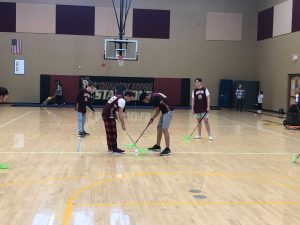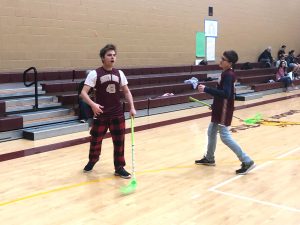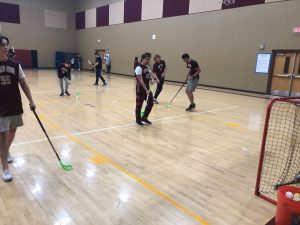- Slug: Sports-Seton Catholic coach. 1,153 words.
- 3 photos available.
By Jerry Walker
Cronkite News
SURPRISE – For a group of students at Shadow Ridge High School, a trip to Sweden in 2021 was going to be a once-in-a-lifetime opportunity to represent the United States at the Special Olympics World Winter Games in unified floorball. A year later, the team members are facing multiple challenges to realize their dream.
Floorball is a ball-and-stick game with similarities to hockey sports. The unified team at SRHS, led by coach Julie Rodriguez, was chosen by the Special Olympics to be one of the two teams to represent the United States at the Games. The Arizona squad is made up of 10 players: four neurotypical competitors and six intellectually disabled athletes. The other U.S. team is from Texas.
The first setback that Rodriquez’s team was confronted with was when last year’s Special Olympics World Winter Games was canceled due to a loss of funding by Sweden’s Paralympic Committee. The event was pushed back a year to 2022 and moved to Kazan, Russia. Because of the coronavirus pandemic, the Games were then postponed another year. They are scheduled to take place in January of 2023.
The team was able to take some positives from the Games’ first delay.
“For 2021 I was kinda happy it was postponed because it gave us more time to develop since we had not been practicing much as a team, team captain Jackson Moran said.
Since the team had been playing together on a regular basis for only a little over a year, the additional time allowed the players to improve their individual skills and develop better chemistry with one another.
“I was a little disappointed because we had been practicing this much trying to get better,” Blaise Cosentino said. “It is a little frustrating, but at the same time we can wait and get better and practice more.”
While the first postponement had its benefits, the second delay created some doubt about whether the Games would even take place.
“I kinda thought it was a little weird because I just thought it was going to happen right this year, before we found out the vaccines couldn’t get through to the other countries,” Rhys Johansson said.
The second postponement also threw a wrench in the plans of Rodriguez because a few players, including Moran, are seniors and will be graduating and moving on to college.
Moran also plays ice hockey and has been a “driving force,” Rodriquez said, in the development of the other players’ skills. The loss of such an influential player will have an impact on the team, without question. But it also gives other players the opportunity to step up and take advantage of their increased roles.
“It’s gonna be rough, but I feel like we can definitely work through it,” Noah Gregory said. “We’re a very strategic team. We have people in other positions and they know how to play it – like our goalies are just rocking it right now.”
Like Moran, Gregory is set to graduate in the spring. However, he is much more optimistic about the World Winter Games taking place and about his prospects of playing on the team in Russia even after graduation.
“It is still gonna happen because it’s the Olympics and the Olympics never don’t happen,” Gregory said. “So I am not really worried about it. But I know that I am going to be staying in Arizona so I’ll be around here so I’ll be able to participate.”
Along with the issues that have arisen due to not knowing whether or not they will still be going to Russia, the logistics of actually getting halfway around the world for the event have been a challenge.
Getting to Russia is by no means easy or cheap. Recently, the least expensive ticket for a roundtrip flight from Phoenix to Kazan, Russia, was $1,515. For a team of 10 players and one coach, the flights alone will cost at least $16,665. To raise such a large sum, it is necessary to fundraise, and that’s not easy, either.
“(Fundraising) has been surprisingly very slow,” Rodriguez said. “It is very hard.”
She added, “If everyone donated a dollar, that high amount would be done quickly. But I think that a lot of people think that if they don’t make a large donation, then they feel bad, and it’s one of those things that it takes a village.”
The team’s goal is to raise $90,000 for the trip. Since they started fundraising over a year ago they have reached 17 percent of their target or $15,000.
The team has other expenses for which it needs to raise money. For example, getting new and specialized equipment is very important for the unified floorball team since the equipment that is used tends to be lighter and safer than the regular equipment used in hockey.
“There are also special uniforms,” Rodriguez said. “When I say special uniforms it’s that for example we want to have our own, we don’t want to borrow the basketball team’s jerseys. We want our own jerseys just like everybody wants and the school does not have funding for that, so we have to fundraise for those things as well.”
The process of fundraising can take many different forms. Some of the more common are reaching out to companies for sponsorships, using online sites such as GoFundMe and selling items to make some money. The floorball team has used all of these methods.
“Just do what we can to get what we need,” Rodriguez said.
While there is some money to be made selling homemade items, in an era of technology the easiest way teams around the country have raised money is by setting up online donation pages. For the floorball team, the majority of the money it has raised has come from its online donation site, soazfloorball.org.
“I think it’s looking different because we’re not just doing a lot of restaurant sponsorships,” Johansson said. “We are just having money being sent out from people that want to support us on the trip next year, and that’s really cool.”
The team has received valuable non-monetary support from companies such as Gatorade, which has donated drinks for practice, and Under Armour, which has donated shoes.
With the possibility looming that the World Winter Games could be canceled again, it raises the question of what would happen to the funds for the trip that have already been collected.
“If it permanently gets canceled, those funds would then be for the Dysart school district,” Rodriguez said. “Because even though this is one major event for the World Winter Games, we have unified sports all the time through the Special Olympics.”
No matter what happens, the players have developed a bond that will last a lifetime. And who knows, maybe this new “family,” as Gregory described her team, will cause some trouble for teams in Russia and bring a medal home.


